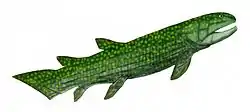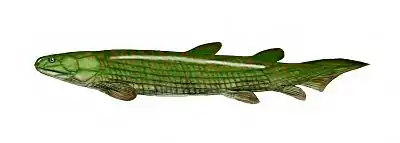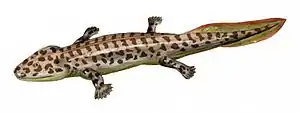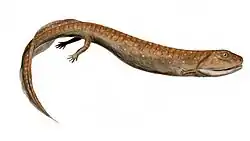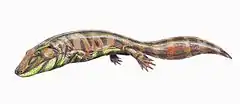Megalocephalus
Megalocephalus (meaning "big head") is an extinct genus of baphetid amphibian from the late Carboniferous of the British Isles.[3] It contains two species, M. pachycephalus and M. lineolatus.[2]
| Megalocephalus Temporal range: Late Carboniferous | |
|---|---|
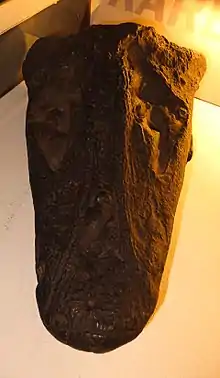 | |
| Skull | |
| Scientific classification | |
| Kingdom: | Animalia |
| Phylum: | Chordata |
| Family: | †Baphetidae |
| Subfamily: | †Loxommatinae |
| Genus: | †Megalocephalus Barkas, 1873 |
| Type species | |
| †Megalocephalus pachycephalus Barkas, 1873 | |
| Species | |
| Synonyms | |
| |
Description
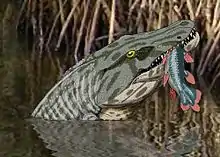
Restoration
Megalocephalus was an amphibian, measuring 1.5 metres (4.9 ft) from head to tail.[3]
Skull
It is only known from its skull, like most other baphetids. The skull of Megalocephalus was 30 centimetres (12 in) long. The teeth of Megalocephalus were long and pointed. Baphetids had a small elongation of their eye sockets, of which the current use for is not certain. It has been suggested that the elongation was housing for a salt gland to get rid of excess salt, or an extra region for jaw muscle attachments, to allow a harder bite force.[3]
References
- "Megalocephalus Fossil from Maoming, Guangdong, China". www.artsourceasia.com. Retrieved 2008-08-15.
- "Confirmation of Romer's Gap as a low oxygen interval constraining the timing of initial arthropod and vertebrate terrestrialization". Ward et al. National Academy of Sciences. 2008. Retrieved 2008-08-15.
- Benson, R.; Anderson, J.; Brusatte, S.; Clack, J.; Dennis-Bryan, K.; Duffin, C.; Hone, D.; Naish, D.; Xu, X.; Prothero, D.; Parsons, K.; Milner, A.; Johanson, Z. (2012). Prehistoric Life. London: Dorling Kindersley. p. 165. ISBN 978-0-7566-9910-9.
External links
- Megalocephalus at the Paleobiology Database
- A new baphetid (stem tetrapod) from the Upper Carboniferous of Tyne and Wear, U.K., and the evolution of the tetrapod occiput. By J.A. Clack
This article is issued from Wikipedia. The text is licensed under Creative Commons - Attribution - Sharealike. Additional terms may apply for the media files.

